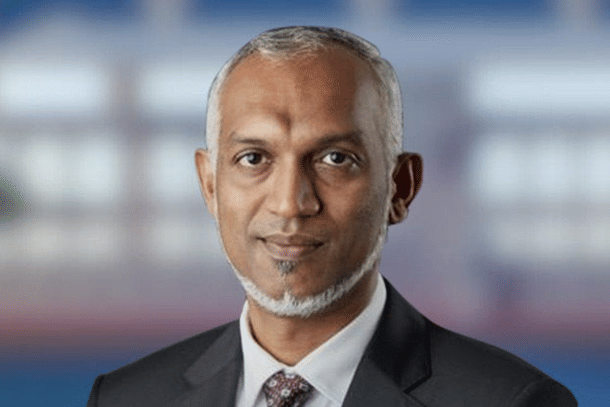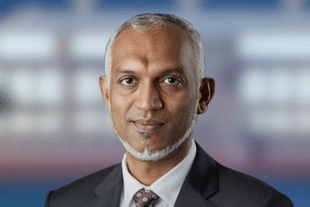World
Maldives' President-Elect Wants Indian Troops Out, Also Rules Out Chinese Military Presence In Island Nation
Swarajya Staff
Oct 27, 2023, 01:34 PM | Updated 01:34 PM IST
Save & read from anywhere!
Bookmark stories for easy access on any device or the Swarajya app.


Maldives is aiming to be be “fully independent” and will ask Indian troops stationed in the island nation to leave, according to the country's President-elect Mohamed Muizzu.
This comes as both India and China are trying to establish their dominance in the region.
During a contentious election, Muizzu criticized the sitting president, Ibrahim Solih, for giving India too much influence over the Maldives and compromising the nation's independence by allowing Indian military personnel to be based there.
Muizzu, the soon-to-be leader of the Indian Ocean island chain, mentioned in an interview with Bloomberg TV that the presence of foreign military, regardless of the country, is concerning.
He emphasised that his stance would remain unchanged even if the troops belonged to a different nation.
Around 70 Indian military personnel maintain radar stations and surveillance planes sponsored by New Delhi in the Maldives.
Additionally, Indian warships assist in monitoring the Maldives' exclusive economic zone.
Muizzu said he has already begun negotiations with the Indian government on removing its military presence, calling those talks “very successful already".
“We want a bilateral relationship that’s mutually beneficial,” Muizzu said,
He added that Indian soldiers won’t be replaced by troops from other countries.
Asking India to remove military personnel no way indicates “that I’m going to allow China or any other country to bring their military troops here,” he said.
The election results further highlight the ongoing competition between China and India over their influence in the strategically significant Indian Ocean.
Historically, Maldivian governments have leaned towards either India or China. Both Asian giants have heavily invested in the Maldives, offering loans and infrastructure development.
US and its allies like Japan, and Australia are trying to counteract Beijing's growing confidence and influence by supporting India as a significant ally in Asia. This strategy seemed effective when Solih, Muizzu's predecessor, brought the Maldives closer to India.
Muizzu plans to recalibrate the nation's stance by removing Indian troops and addressing trade imbalances with its South Asian counterpart.
“We want assistance, cooperation with all the countries,” Muizzu said, dismissing the notion that the elections were a referendum on closer ties with either China or India.
Muizzu, previously an engineer and the mayor of Male, leads a political party that had embraced Chinese financial support and had suppressed opposition during its previous tenure about half a decade ago.
Maldives, with its population of just over half a million scattered across 187 islands, is a popular tourist spot and is vulnerable to climate change. Its location is also crucial for maritime trade in the Indian Ocean.
India, a dominant force in the region, has expressed its willingness to cooperate with the new Maldivian administration, albeit with caution.
“We look forward to constructively engaging with the incoming administration and discussing ways to enhance our relationship further,” Arindam Bagchi, spokesperson for India’s Ministry of External Affairs, told reporters last week.
When questioned about maritime security ties and the Indian military's presence, Bagchi emphasized India's commitment to a diverse range of collaborations that benefit the people of the Maldives.
Bagchi highlighted that India has conducted 500 medical evacuations in the past five years, rescuing 523 Maldivians, underscoring India's continued support to the country.
India had extended a $1.4 billion financial package to Maldives in 2018 to stabilise the island economy and subsequently provided $500 million to build bridges and causeways linking Male to neighboring islands in 2020.
Muizzu said he intends to work closely with all countries.
He added that Maldives was too small to take sides in a “geopolitical rivalry between bigger nations.”
“Maldives first,” said Muizzu, who is scheduled to take office on 15 November.
“That’s, I think, something that can be easily understood," he added.





